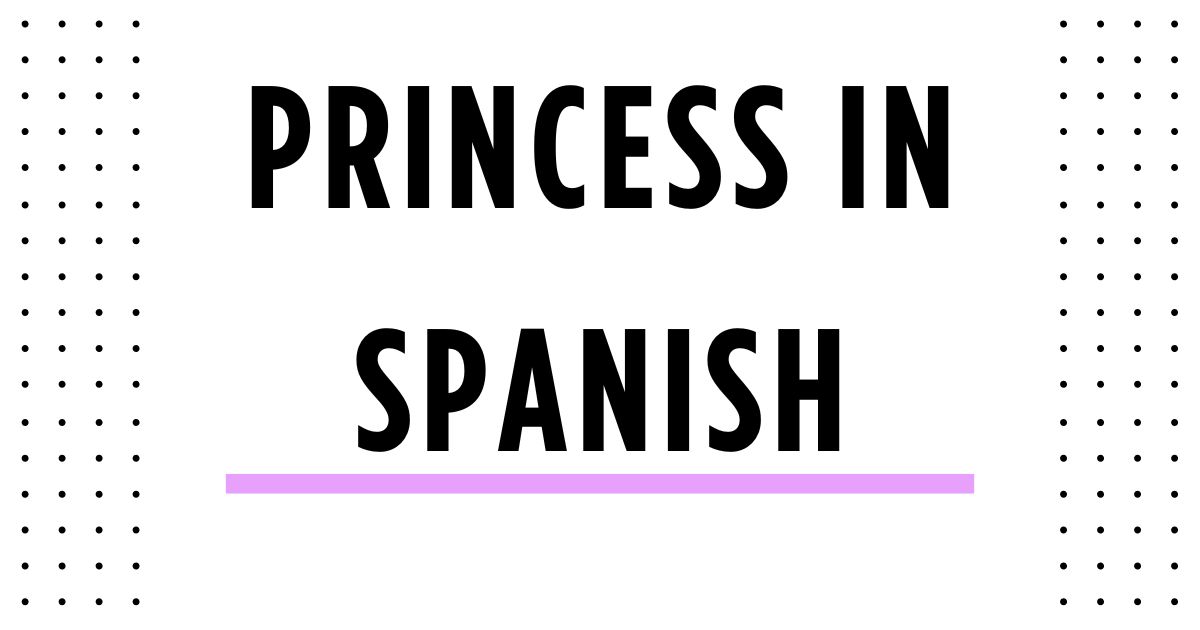The word princess in Spanish translates to “princesa”. It’s a feminine noun used to describe the daughter of a king or queen, or a woman married to a prince. But beyond its dictionary definition, the term princesa carries a wealth of cultural, emotional, and even romantic significance in Spanish-speaking communities.
The Linguistic Breakdown of “Princesa”
In Spanish, nouns have gender. “Princesa” is the feminine form, while the masculine counterpart is “príncipe,” meaning prince. The word comes from the Latin “princeps,” which means first or foremost—highlighting royal lineage and nobility.
How to Pronounce Princesa Correctly
In Spanish, “princesa” is pronounced as: preen-SEH-sah. The stress falls on the second syllable. It’s important to soften your vowels and avoid hard ‘s’ sounds typical of English.
Different Contexts for Using “Princesa”
“Princesa” isn’t just used for literal royalty. It’s also a popular term of endearment. For instance, many parents call their daughters mi princesa (my princess). In romantic settings, a boyfriend might refer to his partner as princesa to show affection.
Royalty and Fairy Tales in Hispanic Culture
The concept of a princess is deeply embedded in Spanish-speaking folklore and storytelling. From classic fairy tales to Latin American legends, princesses represent innocence, beauty, and dreams. Think of tales like La Princesa y el Guisante (The Princess and the Pea), often told with cultural twists.
The Modern Symbolism of Princesa
Today, calling someone princesa isn’t just about royalty—it’s about value, care, and love. It symbolizes how someone is treated with dignity, respect, and softness. In pop culture, it has evolved to describe someone pampered or elegant.
How “Princesa” is Used in Latin Music and Pop Culture
Latin music is full of romantic expressions, and princesa shows up often. Artists like Frank Reyes and Río Roma have songs titled “Princesa,” using the term as a romantic ideal. It reflects longing, admiration, and emotional depth.
Common Spanish Phrases with Princesa
Here are a few sweet and useful phrases:
Eres mi princesa – You are my princess.
Hola, princesa – Hello, princess.
Duerme bien, mi princesa – Sleep well, my princess.
La princesa del cuento – The princess of the story.
These are commonly used in families, relationships, and even literature.
Cultural Significance of Princesses in Spanish-Speaking Countries
In many Hispanic cultures, princesses play a central role in children’s early learning through books, cartoons, and games. They symbolize dreams, imagination, and future potential. In Latin America, events like the quinceañera can feel like a girl’s transformation into a “princess for a day.”
“Princesa” in Parenting and Childhood
Spanish-speaking parents often use the word princesa to refer to their daughters as a sign of love and care. It becomes part of daily language, shaping a child’s sense of self-worth and identity.
How Movies Influence the Word Princesa
Disney movies dubbed in Spanish have a huge influence on how the word princesa is understood. From La Bella Durmiente (Sleeping Beauty) to La Princesa y el Sapo (The Princess and the Frog), the image of a princesa is reinforced with elegance, bravery, and kindness.
Comparison With Other Romance Languages
In Italian, princess is principessa, in French it’s princesse, and in Portuguese, it’s princesa. All stem from Latin, and all carry similar meanings. Spanish, however, tends to use it more casually as a loving nickname.
When Not to Use Princesa
While it’s often affectionate, calling someone princesa can sound sarcastic if used in the wrong tone. For example, in some conversations, it may imply someone is acting spoiled. Context and tone are everything.
Gendered Language and Inclusivity
Spanish is a gendered language, so the word princesa is strictly feminine. With evolving views on gender identity, some communities are reimagining how to use these traditional terms more inclusively, though “princesa” still widely refers to girls and women.
How to Write a Love Letter with “Princesa”
If you’re writing a romantic note or poem in Spanish, using princesa adds charm and elegance. Something as simple as “Para mi querida princesa…” (To my dear princess…) can melt hearts.
Using Princesa in Social Media Captions
In the world of Instagram and TikTok, captions like Feliz cumpleaños a mi princesa (Happy birthday to my princess) or Mi princesa hermosa (My beautiful princess) are extremely common for expressing love and admiration.
Why Learning Words Like Princesa Matters
Learning culturally rich words like princesa does more than build your vocabulary. It helps you connect emotionally with Spanish-speaking people. These words carry tradition, nuance, and humanity—making your communication heartfelt.
Conclusion
Whether you’re using “princesa” to talk about fairy tales, express love, or nickname your daughter, this simple word carries a powerful emotional punch in Spanish. It evokes imagery of elegance, royalty, and affection. So next time you call someone mi princesa, remember—you’re speaking volumes with just one word.
FAQs
Is “princesa” only used for royalty in Spanish?
No, “princesa” is used as both a literal term for royalty and a casual term of endearment for girls and women.
How do you say “my princess” in Spanish?
You say mi princesa. It’s commonly used to express love and affection.
Can “princesa” be used sarcastically?
Yes, depending on the tone and context, it can imply someone is acting spoiled or overly delicate.
Is “princesa” gender-specific?
Yes, “princesa” is feminine. The masculine form is “príncipe” (prince).
Are there songs or movies that use the word “princesa”?
Absolutely! Many Latin love songs and Spanish-dubbed Disney films include or revolve around the word “princesa.”















